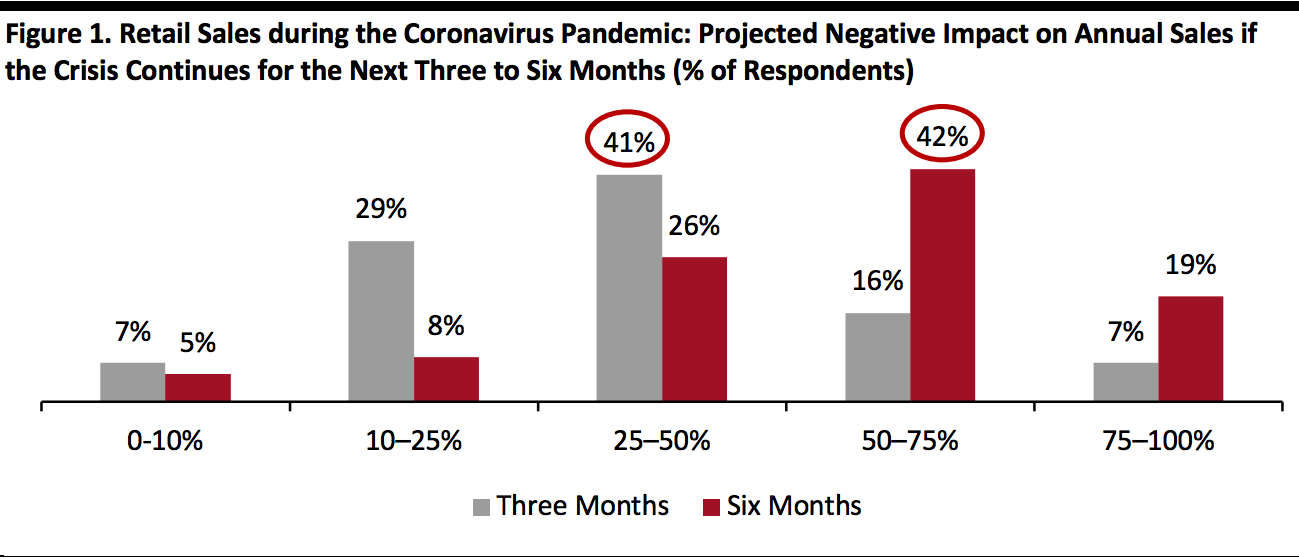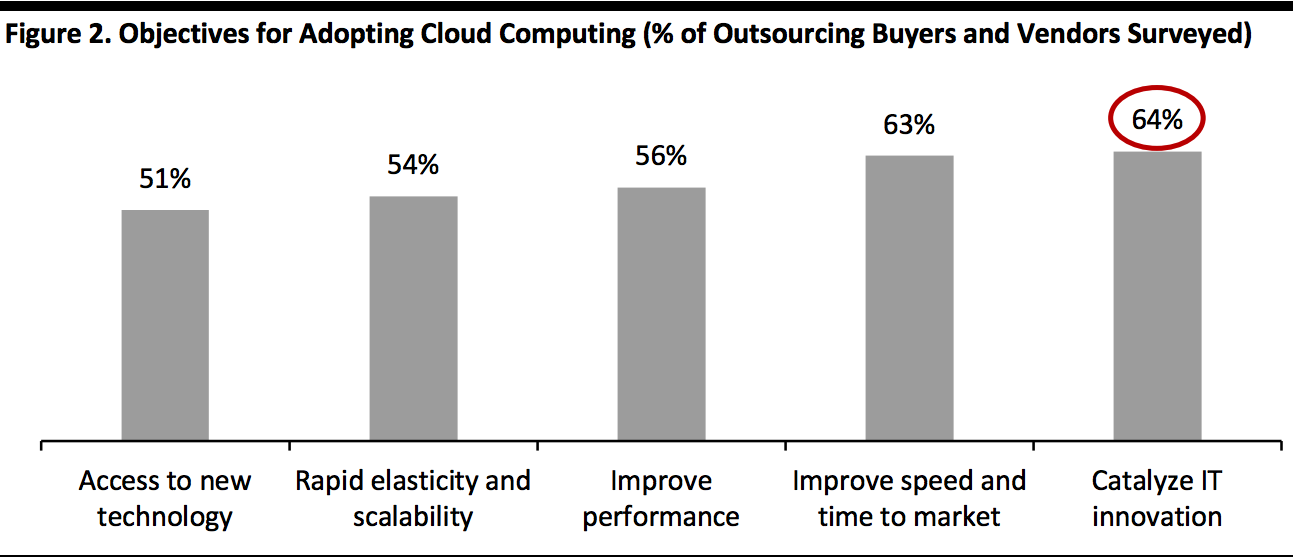
Nitheesh NH
In this report, we discuss the role of outsourcing in the current global crisis and offer insights into how retail organizations can leverage this strategy to better manage costs.
 Base: 1,711 retailers for three months, 1,704 retailers for six months; surveyed on March 19–23, 2020
Base: 1,711 retailers for three months, 1,704 retailers for six months; surveyed on March 19–23, 2020
Source: NuORDER[/caption] Various Functions Can Be Outsourced Retailers can outsource a number of business functions, including HR, IT, marketing and even finance, such as a Chief Financial Officer (CFO) role. Retailers can outsource the creation and implementation of their marketing campaigns to specialized agencies. For example, Walmart outsources part of its marketing operations to Selligent Marketing Cloud, a business-to-consumer platform that enables marketers to target, trigger and deliver cross-channel personalized messaging. Digital marketing agencies are often more efficient than in-house marketing teams and can be a less expensive resource. In terms of customer services, Office Depot outsources part of its operations to Quiq, a customer-engagement platform that enables end-consumers to engage with companies and seek post-sales support via SMS/text messaging, Facebook Messenger and the Kik Messenger mobile app. Such customer support agencies can also take on back-office services, such as data entry, research and data verification. HR outsourcing offers retailers opportunity to reduce administration costs—including training, legal and compliance—as well as the associated costs of having sufficient office space for a HR department, which can be particularly expensive for large firms located in major cities. For instance, BCBG Max Azria, a US-based contemporary women's clothing brand, outsources its HR function to Michael Page, a British-based recruitment business. Even a CFO role can be outsourced: An outsourced CFO is a financial expert who provides financial strategy services on a part-time or project basis. Mattress retailer Casper and grocery retailer Instacart have each partnered with accounting software-as-a-service company InDinero to manage their finances. Outsourcing this function can help a company to resolve challenges such as cash flow issues, raising capital and operating within tight margins. Outsourcing in the Supply Chain Many retailers outsource supply-chain processes to specialist providers in order to expedite operations and save costs. Target Corporation hired Li & Fung, a Hong Kong-based supply chain management company, to source and manage part of its apparel portfolio; Sephora and Speedo hired Tecsys, a New York-based provider of supply chain solutions, to manage its warehouse delivery; Pepsi, Tesco and The Home Depot work with Prologis, a company that offers real-estate and supply-chain logistics solutions. Looking ahead, logistics company DHL expects more retailers to outsource e-commerce fulfillment in the next three to five years; goals will include shorter delivery times and increased efficiency in warehouses. Base: 1,500+ global outsourcing buyers and vendors; surveyed in 2018
Base: 1,500+ global outsourcing buyers and vendors; surveyed in 2018
Source: Deloitte[/caption] A strong case in point is Automation Anywhere—an enterprise-grade, cognitive robotic process automation (RPA) company—which launched a purely web-based digital workforce platform in 2019. The platform can deliver RPA as a service to users and businesses through multiple delivery channels. Another key technology in this field is artificial intelligence (AI). Chatbots, for example, leverage AI to mimic conversations with people. They can automate a variety of business processes from technology helpdesks, customer contact centers and HR recruitment to procurement and compliance checking, which all greatly reduce operating costs for organizations.
Selective Outsourcing Creates More Flexible Costs for Retailers during a Crisis
Amid the ongoing coronavirus pandemic, we anticipate a wave of outsourcing among companies looking to reduce their fixed costs. This is likely to focus on central or shared functional business units such as marketing and HR. Outsourcing is not simply about reducing costs, but also switching from the fixed costs associated with in-house operations to the variable costs of using third parties on more flexible terms. In a volatile market, a variable cost base provides a buffer against unpredictable swings in demand. The coronavirus outbreak is unprecedented, and firms are tentatively finding their way through the crisis. We expect that more companies will look to implement outsourcing strategies in order to scale operations as budgets permit and demand requires. In addition to benefitting outsourcing giants, such a shift would likely feed into the freelance economy—although underlying demand for some functions such as marketing may decline as companies prioritize their spending. There are a number of potential benefits that outsourcing offers to retailers:- Cost reduction: Businesses can save up to 15% of their annual costs by outsourcing their services, according to outsourcing company DBA Advisory. Outsourcing also allows companies to avoid cost obligations such as employee health insurance and vacation pay. This cost-saving model is therefore an advantage for retailers in a downturn economy.
- More focus on company’s core competencies: With outsourcing resulting in a lower number of employees and in-house tasks, companies can dedicate more time and energy to their core competencies.
- Improved efficiency: During difficult times—such as the coronavirus outbreak—consumer demand may become more unpredictable and staff levels fluctuate. This means that work responsibilities would shift among a pool of employees, resulting in highly skilled workers spending time on low-value tasks. By outsourcing work, companies can seamlessly fill any gaps to prevent such efficiency breakdowns.
 Base: 1,711 retailers for three months, 1,704 retailers for six months; surveyed on March 19–23, 2020
Base: 1,711 retailers for three months, 1,704 retailers for six months; surveyed on March 19–23, 2020Source: NuORDER[/caption] Various Functions Can Be Outsourced Retailers can outsource a number of business functions, including HR, IT, marketing and even finance, such as a Chief Financial Officer (CFO) role. Retailers can outsource the creation and implementation of their marketing campaigns to specialized agencies. For example, Walmart outsources part of its marketing operations to Selligent Marketing Cloud, a business-to-consumer platform that enables marketers to target, trigger and deliver cross-channel personalized messaging. Digital marketing agencies are often more efficient than in-house marketing teams and can be a less expensive resource. In terms of customer services, Office Depot outsources part of its operations to Quiq, a customer-engagement platform that enables end-consumers to engage with companies and seek post-sales support via SMS/text messaging, Facebook Messenger and the Kik Messenger mobile app. Such customer support agencies can also take on back-office services, such as data entry, research and data verification. HR outsourcing offers retailers opportunity to reduce administration costs—including training, legal and compliance—as well as the associated costs of having sufficient office space for a HR department, which can be particularly expensive for large firms located in major cities. For instance, BCBG Max Azria, a US-based contemporary women's clothing brand, outsources its HR function to Michael Page, a British-based recruitment business. Even a CFO role can be outsourced: An outsourced CFO is a financial expert who provides financial strategy services on a part-time or project basis. Mattress retailer Casper and grocery retailer Instacart have each partnered with accounting software-as-a-service company InDinero to manage their finances. Outsourcing this function can help a company to resolve challenges such as cash flow issues, raising capital and operating within tight margins. Outsourcing in the Supply Chain Many retailers outsource supply-chain processes to specialist providers in order to expedite operations and save costs. Target Corporation hired Li & Fung, a Hong Kong-based supply chain management company, to source and manage part of its apparel portfolio; Sephora and Speedo hired Tecsys, a New York-based provider of supply chain solutions, to manage its warehouse delivery; Pepsi, Tesco and The Home Depot work with Prologis, a company that offers real-estate and supply-chain logistics solutions. Looking ahead, logistics company DHL expects more retailers to outsource e-commerce fulfillment in the next three to five years; goals will include shorter delivery times and increased efficiency in warehouses.
A Shift to Outsourcing Would Likely Feed into the Freelance Economy, Supported by Transformative Technologies
The global market for outsourcing business processes was valued at $221.5 billion in 2019 and is expected to witness a CAGR of 8.0% to reach $405.6 billion by 2027, according to business consulting firm Grand View Research. Following the unexpected coronavirus pandemic, we expect the gig economy to boom as an increasing number of companies look to outsource functions through short-term contracts—including in the retail industry. We also expect that the adoption of new technologies will enable organizations to achieve cost reductions and strategic goals. Cloud computing has been one of the most transformative technologies observed in the outsourcing industry to date. It has given rise to “as-a-service” models and has supported growth in adjacent IT services, such as data-center services and enterprise network outsourcing. In a 2018 survey by Deloitte, 64% of outsourcing buyers and vendors said that adopting cloud computing can help companies to catalyze IT innovation, while 63% believed that it can improve (business/product) speed and time to market (see Figure 2). [caption id="attachment_108172" align="aligncenter" width="580"] Base: 1,500+ global outsourcing buyers and vendors; surveyed in 2018
Base: 1,500+ global outsourcing buyers and vendors; surveyed in 2018Source: Deloitte[/caption] A strong case in point is Automation Anywhere—an enterprise-grade, cognitive robotic process automation (RPA) company—which launched a purely web-based digital workforce platform in 2019. The platform can deliver RPA as a service to users and businesses through multiple delivery channels. Another key technology in this field is artificial intelligence (AI). Chatbots, for example, leverage AI to mimic conversations with people. They can automate a variety of business processes from technology helpdesks, customer contact centers and HR recruitment to procurement and compliance checking, which all greatly reduce operating costs for organizations.